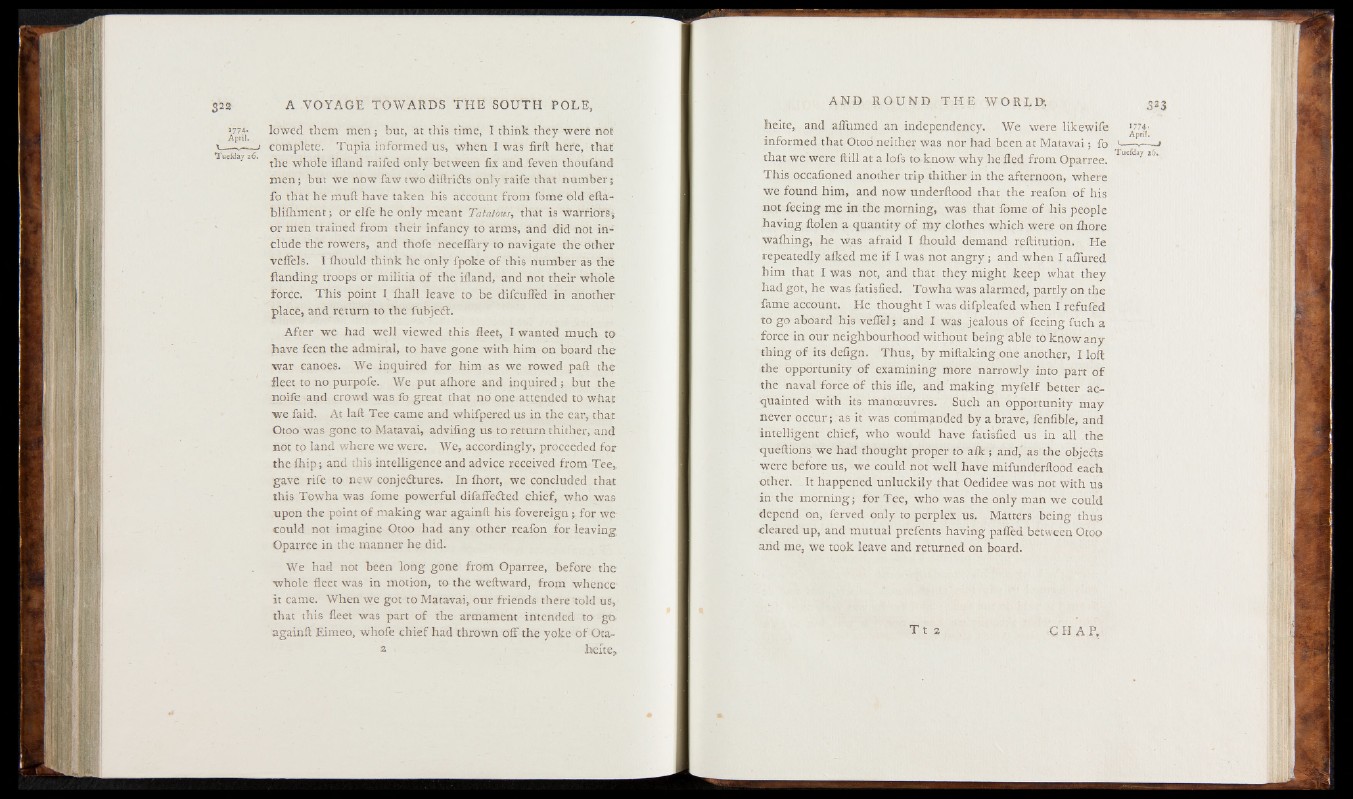
'774- lowed them men ; but, at this time, I think they were not April. ; t r
v— .----1 complete. Tupia informed us, when I was firft here, that
Tucfday 26. wj10je j£jantj raifed only between fix and feven thoufand
men; but we now faw two diftridts only raife that number;
fo that he mull have taken his account from fome old efta-
blifhment; or elfe he only meant Tatatous, that is warriors,
or men trained from their infancy to arms, and did not include
the rowers, and thofe necefFary to navigate the other
veilels. I fhould think he only fpoke of this number as the
{landing troops or militia of the ifland, and not their whole
force. This point I fhall leave to be difcuffed in another
place, and return to the fubjedt
After we had well viewed this fleet, I wanted much to
have feen the admiral, to have gone with him on board the
war canoes. We inquired for him as we rowed paft the
fleet to no purpofe. We put afhore and inquired ; but the
noife and crowd was fo great that no one attended to what
we faid. At laft Tee came and whifpered us in the ear, that
Otoo was gone to Matavai, advifing us to return thither, and
not to land where we were. We, accordingly, proceeded for
the fhip; and this intelligence and advice received from Tee,
gave rife to new conjectures. In Ihort, we concluded that
this Towha was fome powerful difaffedled chief, who was
upon the point of making war againft his fovereign ; for we
could not imagine Otoo had any other reafon for leaving
Oparree in the manner he did.
We had not been long gone from Oparree, before the
whole fleet was in motion, to the weftward, from whence
it came. When we got to Matavai, our friends there told us,
that this fleet was part of the armament intended to go
againft Eimeo, whofe chief had thrown off the yoke of Ota-
2 1 Jheite,
heite, and affirmed an independency. We were likewife >774--
• r , April. informed that Otoo neither was nor had been at Matavai; fo '----.—-#
that we were ftill at a lofs to know why he fled from Oparree. Tucrda>' *6'
This occafioned another trip thither in the afternoon, where
we found him, and now underftood that the reafon of his
not feeing me in the morning, was that fome of his people
having ftolen a quantity of my clothes which were on fhore
waftung, he was afraid I fhould demand reftitution. He
repeatedly afked me if I was not angry; and when I affured
him that I was not, and that they might keep what they
had got, he was fatisfied. Towha was alarmed, partly on the
fame account. He thought I was difpleafed when I refufed
to go aboard his veffel; and I was jealous of feeing fuch a
force in our neighbourhood without being able to know any
thing of its defign. Thus, by miftaking one another, I loft
the opportunity of examining more narrowly into part of
the naval force of this ille, and making myfelf better acquainted
with its manoeuvres. Such an opportunity may
never occur; as it was commanded by a brave, fenfible, and
intelligent chief, who would have fatisfied us in all the
queftions we had thought proper to alk; and,’ as the objedts
were before us, we could not well have mifunderftood each
other. It happened unluckily that Oedidee was not with us
in the morning; for Tee, who was the only man we could
depend on, ferved only to perplex us. Matters being thus
cleared up, and mutual prefents having palled between Otoo
and me, we took leave and returned on board.
T t s CH A P ,